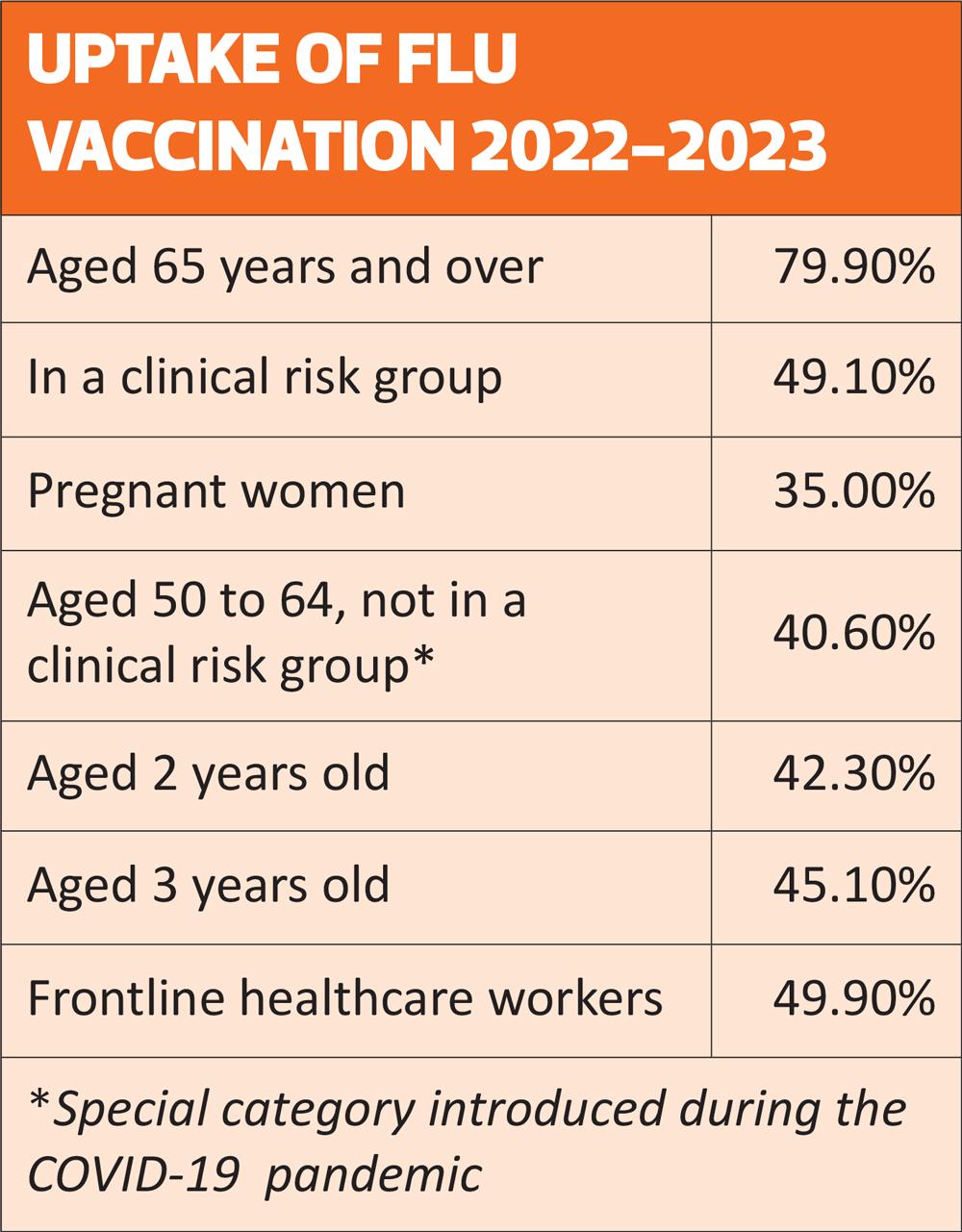
Latest announcements on COVID boosters and seasonal flu vaccinations
Practice Nurse 2023;53(4):6
Practice Nurse 2023;53(4):6
People at greatest risk of serious illness from COVID-19, including care home residents, over 65s and frontline health and social care workers, are eligible for an autumn vaccine booster.
According to the Joint Committee on Vaccination and Immunisation (JCVI), older adults with underlying health conditions are at the highest risk of severe COVID-19, compared with people of a similar age.1
People who are unvaccinated should be offered a single dose of vaccine, which is expected to provide at least as good an immune response as 2 primary doses of vaccine. This, combined with the offer of primary courses only to those eligible for booster vaccination will simplify the programme such that a single dose is offered to eligible persons in autumn 2023 irrespective of prior vaccination status, potentially enhancing vaccine access and uptake.
Eligible groups
- Residents in care homes for older adults
- All adults aged 65 years and over
- People aged 6 months to 64 years in a clinical risk group
- Frontline health and social care workers
- People aged 12 to 64 years who are household contacts of people with immunosuppression
- People aged 16 to 64 years who are carers, and staff working in care homes for older adults
Population – ‘herd’ – immunity continues to increase with many people having hybrid immunity through a combination of vaccination and recovery from natural infection. However, virus variants also continue to emerge. The virulence and transmissibility of any new emergent SARS-CoV-2 variant cannot be reliably predicted in advance. Rapid response measures may be required if there are substantial changes in population immunity against the dominant circulating variant.
Although the JCVI has advised the autumn programme should aim to complete vaccinations by early December 2023, at the time of writing, NHS England had yet to confirm when the programme will start.
The campaign will run alongside the seasonal flu programme, which ‘remains a critically important public health intervention and a key priority for 2023 to 2024 to reduce morbidity, mortality and hospitalisation associated with flu.’
SEASONAL FLU CAMPAIGN
The flu season comes at a time when the NHS and social care will be managing winter pressures while continuing to recover from the impact of the COVID-19 pandemic – and the impact of industrial action by nurses, junior doctors and consultants.
NHSE says: ‘The delivery of the NHS flu immunisation programme over recent seasons has been both ambitious and challenging as we sought to offer protection to as many eligible people as possible, exceeding the World Health Organization (WHO) target for those aged 65 years and above for a third season running.’2 However, this achievement was not matched in any other eligible group (See Table).
The groups eligible for the flu vaccine are the same as those eligible for the COVID-19 vaccine, with the addition of:
- Pregnant women
- All children aged 2 or 3 years on 31 August 2023
- Primary school-aged children
- Secondary school-aged children (Years 7-11)
- All those in long-stay residential homes
- All those who receive carer’s allowance, or who are the main carer of an elderly or disabled person
- Close contacts of immunocompromised individuals
Eligible school aged children (including those in clinical risk groups) will be offered immunisation by the school immunisation service. However, general practices should continue to invite eligible school aged children in clinical risk groups for flu vaccination to ensure that they can access a vaccine before flu starts to circulate, where school sessions may be scheduled for later in the season or have been missed.
Providers are expected to deliver a 100% offer to eligible groups. Providers should aim to equal or exceed last season’s (2022 to 2023) uptake particularly in clinical risk groups, children aged 2 and 3 years old, and pregnant women.
No changes have been recommended by JCVI for adult flu vaccines for 2023 to 2024. Where live attenuated influenza vaccine (LAIV, Fluenz® Tetra) is contraindicated or unacceptable (e.g. because of its porcine gelatine content), children aged 6 months to less than 2 years, and aged 1 to 18 years, in a clinical risk group, and children in eligible school cohorts should be offered cell-based quadrivalent influenza vaccine (QIVc). These vaccines will be available to order through ImmForm and are not reimbursable.
- See Changes to the shingles vaccination programme
1. JCVI statement on the COVID-19 vaccination programme for Autumn 2023; 8 August 2023. https://www.gov.uk/government/ publications/covid-19-autumn-2023-vaccination-programme-jcvi-advice-26-may-2023/jcvi-statement-on-the-covid-19-vaccination-programme-for-autumn-2023-26-may-2023
2. DHSC, NHSE, UKHSA. National flu immunisation programme 2023 to 2024 letter; updated 3 July 2023. https://www.gov.uk/ government/ publications/national-flu-immunisation-programme-plan/national-flu-immunisation-programme-2023-to-2024-letter
Related articles
View all Articles
